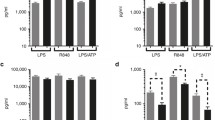Abstract
Objective and design
Procalcitonin (ProCT) is increased in serum of septic patients and those with systemic inflammation. Endogenous levels of ProCT might influence the response of polymorphonuclear leukocytes (PMNs), independently of endotoxin, in clinical disease.
Subjects
Healthy human volunteers.
Treatment
Recombinant human ProCT (rhProCT).
Methods
Whole blood and PMNs were exposed in vitro to exogenous rhProCT. Interleukin (IL)-6, IL-8, IL-10, IL-13, tumor necrosis factor-alpha (TNFα), IL-1β, and macrophage inflammatory protein (MIP)-1β (pg/ml) were measured by multiplex suspension bead-array immunoassay, and migration and phagocytosis were measured in PMNs.
Results
In a whole-blood model, a dose-dependent increase in IL-6, TNFα, and IL-1β of the cell-free supernatant was noted. Pre-incubation with ProCT, at doses consistent with clinical sepsis, resulted in a decrease in PMN migration without alteration in phagocytosis of Staphylococcus aureus or indirect measurements of bacterial killing.
Conclusion
Clinically relevant levels of ProCT influence immunologic responses that may contribute to systemic inflammatory response and septic shock.
Similar content being viewed by others
References
Becker KL, Snider R, Nylen ES. Procalcitonin assay in systemic inflammation, infection, and sepsis: clinical utility and limitations. Crit Care Med. 2008;36(3):941–52.
Muller B, White JC, Nylen ES, Snider RH, Becker KL, Habener JF. Ubiquitous expression of the calcitonin-gene in multiple tissues in response to sepsis. J Clin Endocrinol Metab. 2001;86(1):396–404.
Wenisch C, Fladerer P, Patruta S, Krause R, Horl W. Assessment of neutrophil function in patients with septic shock: comparison of methods. Clin Diagn Lab Immunol. 2001;8(1):178–80.
Chishti AD, Shenton BK, Kirby JA, Baudouin SV. Neutrophil chemotaxis and receptor expression in clinical septic shock. Intensive Care Med. 2004;30(4):605–11.
Vespasiano MC, Lewandoski JR, Zimmerman JJ. Longitudinal analysis of neutrophil superoxide anion generation in patients with septic shock. Crit Care Med. 1993;21(5):666–72.
Tavares-Murta BM, Zaparoli M, Ferreira RB, Silva-Vergara ML, Oliveira CH, Murta EF, et al. Failure of neutrophil chemotactic function in septic patients. Crit Care Med. 2002;30(5):1056–61.
Wiedermann FJ, Kaneider N, Egger P, Tiefenthaler W, Wiedermann CJ, Lindner KH, Schobersberger W. Migration of human monocytes in response to procalcitonin. Crit Care Med. 2002;30(5):1112–7.
Monneret G, Arpin M, Venet F, Maghni K, Debard AL, Pachot A, et al. Calcitonin gene related peptide and N-procalcitonin modulate CD11b upregulation in lipopolysaccharide activated monocytes and neutrophils. Intensive Care Med. 2003;29(6):923–8.
Nylen ES, Whang KT, Snider RH Jr, Steinwald PM, White JC, Becker KL. Mortality is increased by procalcitonin and decreased by an antiserum reactive to procalcitonin in experimental sepsis. Crit Care Med. 1998;26(6):1001–6.
Steinwald PM, Whang KT, Becker KL, Snider RH, Nylen ES, White JC. Elevated calcitonin precursor levels are related to mortality in an animal model of sepsis. Crit Care. 1999;3(1):11–6.
Martinez JM, Wagner KE, Snider RH, Nylen ES, Muller B, Sarani B, et al. Late immunoneutralization of procalcitonin arrests the progression of lethal porcine sepsis. Surg Infect (Larchmt). 2001;2(3):193–202.
Becker KL, Nylen ES, Snider RH, Muller B, White JC. Immunoneutralization of procalcitonin as therapy of sepsis. J Endotoxin Res. 2003;9(6):367–74.
Sexton PM, Christopoulos G, Christopoulos A, Nylen ES, Snider RH Jr, Becker KL. Procalcitonin has bioactivity at calcitonin receptor family complexes: potential mediator implications in sepsis. Crit Care Med. 2008;36(5):1637–40.
Gomes RN, Castro-Faria-Neto HC, Bozza PT, Soares MB, Shoemaker CB, David JR, et al. Calcitonin gene-related peptide inhibits local acute inflammation and protects mice against lethal endotoxemia. Shock. 2005;24(6):590–4.
Whang KT, Vath SD, Becker KL, Snider RH, Nylen ES, Muller B, et al. Procalcitonin and proinflammatory cytokine interactions in sepsis. Shock. 2002;14(1):73–8.
Wei JX, Verity A, Garle M, Mahajan R, Wilson V. Examination of the effect of procalcitonin on human leucocytes and the porcine isolated coronary artery. Br J Anaesth. 2008;100(5):612–21.
Sato Y. Modulation of PMN-endothelial cells interactions by cyclic nucleotides. Curr Pharm Des. 2004;10(2):163–70.
Lennon PF, Taylor CT, Stahl GL, Colgan SP. Neutrophil-derived 5′-adenosine monophosphate promotes endothelial barrier function via CD73-mediated conversion to adenosine and endothelial A2B receptor activation. J Exp Med. 1998;188(8):1433–43.
Conflict of interest
None.
Author information
Authors and Affiliations
Corresponding author
Additional information
Responsible Editor: Artur Bauhofer.
The views expressed in this article are those of the authors and do not necessarily reflect the policies of the Department of Veterans Affairs.
Rights and permissions
About this article
Cite this article
Liappis, A.P., Gibbs, K.W., Nylen, E.S. et al. Exogenous procalcitonin evokes a pro-inflammatory cytokine response. Inflamm. Res. 60, 203–207 (2011). https://doi.org/10.1007/s00011-010-0255-8
Received:
Revised:
Accepted:
Published:
Issue Date:
DOI: https://doi.org/10.1007/s00011-010-0255-8




